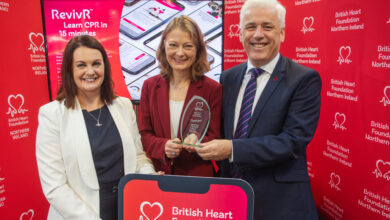A strategic approach to social work


Northern Ireland’s Chief Social Worker Sean Holland assesses the performance of the 10-year Social Work Strategy at its mid-way point and offers his vision for going forward.
Social work has always carried a stigma, explains Holland. However, the effects of that stigma have been compounded in recent years with specific failings of the overall service being played out in the public eye.
The impact of high profile failings, for example the case of the death of Peter Connelly (Baby P) in England, not only damaged the public confidence in the whole social work sector but also dropped morale amongst service providers to its lowest point.
Holland outlines that this crisis of confidence has been a catalyst for a strategic, rather than a reactive, approach to strengthening the sector.
“You had a situation where there was a loss of confidence in social work as a profession, nationally. There was also a loss of confidence within the profession itself and this led us to a more strategic approach rather than a reactive one, looking at how we could strengthen social work in the face of that criticism.”
Holland, who operates in an over-lapping dual role, one as the Deputy Secretary in the Department of Health and the other as Northern Ireland’s Chief Social Worker, highlights that Northern Ireland has its advantages when compared to other regions of the UK.
He points to a quality workforce, driven by high-quality higher education courses offered by Northern Ireland’s universities. Another element of this is that Northern Ireland social workers are employed in the statutory sector, mostly by Health and Social Care Trusts (HSCTs), compared to other regions where local authorities are the main employers.
Holland explains: “Because the HSCTs are designed to employ highly-skilled professionals in the health sector, they are a good employer, with high recruitment standards, a strategy for staff retention and continual investment in professional development.”

Strategy
In 2012, Northern Ireland became the first region in the UK to launch a long-term strategic framework for improvement in social work. Safeguarding Social Wellbeing: A Strategy for Social Work, a 10-year vision, identified 10 strategic priorities under three headings: strengthening the capacity of the workforce, improving social work services and building leadership and trust.
Highlighting some of the successes at the mid-way point of the Strategy’s delivery, Holland points to significant innovations in social work practice, which have now been tested and are ready to be brought to scale.
“One example is the piloting of the new model of working with families where there are concerns about the safety and welfare of children. Signs of Safety is a strength-based approach, accepting from the start that every family, even ones who are struggling, have strengths. There’s a focus on reinforcing and building on these strengths, identifying the gaps and putting the right services in place in the right areas. We have been piloting this scheme in the Western HSC Trust and are now ready to role that model out across Northern Ireland.
“Another development has been the move to improve public understanding of the role social workers do through a Raising the Profile group. A big success in this area was the Find Me a Family BBC documentary which showed both the importance and challenges of the role of social workers, which traditionally have been closed off to the public.”
Social work has also taken its lead from improvements in other sectors, much like the improvement training taking place in healthcare. There is an increased focus on data collection, on measuring performance and using it to promote and facilitate change and improvement. Social work has made a big investment in the area of continuous improvement. A dozen social workers have been trained up to the level of improvement advisors, with a further 60 staff trained to support that work. This team are leading improvement projects across social services in Northern Ireland.
Holland adds: “A further success has been the creation of a standardised regional emergency social work service in Belfast. We’ve moved from an ad hoc system where staff were on call, to a fully resourced one where staff are working throughout the night, taking phone calls and activating an emergency response team.”
As the strategy moves past the halfway point, Holland admits that the approach is set to change: “During the first half of the Strategy we felt it was important that people could feel and see progress, so we selected projects we felt had the potential to succeed and could be delivered. It was important to get people enthused. However, we aim for the second half of the strategy to be driven by those on the front line. We are engaging with social workers about the changes they want to see and getting more people involved in implementing the Strategy. This is a slower way of working, but one that is more sustainable and will deliver longer-term improvement in social care.”
This work is being driven by local engagement partnerships, made up of staff in the area where they work. The aim is that through greater devolution of priority-building, the goals of the next five years will have had significant buy-in from all involved in its delivery.
Also, with the creation of the Strategy came the need to better manage performance and assess the impact the various strategic priorities were having. Statistical performance analysis of the sector has proven difficult, given the nature of the work. And as Holland explains, setting targets based on these statistics does not lend well to the type of service being offered.
“For this reason, a Social Wellbeing Framework has been designed and implemented, taking an outcome-based approach to performance. The Framework looks at four key areas: life control; connectiveness; self-worth; and safety and we are assessing whether these areas of a person’s life have improved as a result of being in contact with a social worker.”
Delivering Together
Strengthening the Strategy featured heavily in the review of Northern Ireland’s healthcare carried out by the expert panel led by Professor Rafael Bengoa and subsequently, was identified as a priority by then Health Minister Michelle O’Neill when unveiling Delivering Together, the 10-year strategy aiming to transform health and social care.
Key priorities, alongside strengthening the Social Work Strategy, included progression on the reform of adult social care, a reduction in children being taken into care through family support measures and further enhancing the almost 30 multi-agency Family Support Hubs in Northern Ireland.
“The delivery of health reform is progressing but not having an Executive or ministerial direction is far from ideal. That said, work has not stalled and we are making progress where we can.
“As civil servants, our trained ethos is to support democratically elected ministers and that’s a position we’d like to get back to. However, while we are waiting for that situation to be delivered, we are continuing with the policy direction that was set out by the most recent minister. We were fortunate that Delivering Together outlined key statements about social work and social care and so we’ve been able to continue to make progress. Obviously though, there are decisions that you want to be able to put before a minister and hopefully that will be the case shortly.”
“During the first half of the Strategy we felt it was important that people could feel and see progress, so we selected projects we felt had the potential to succeed and could be delivered.”
The expert review of adult social care is an example of how the system is currently working. The review, commissioned by the previous minister, has reported on a direction for the future but has not been seen by a health minister. Rather than be left in limbo, they are working to develop new policies and solutions, this will deal with issues such as models of care, who provides that care and how it is paid for – in some cases this might call for radically different responses. However, to bring the report to the next stage, as Holland outlines “political choices need to be made”.
Programme for Government
The latest Programme for Government highlighted the need for greater collaboration across government departments. Social work and social care is a model example of how, when done correctly, greater outcomes can be achieved. Some of the successes that Holland can point to are things like collaboration between housing and social services, allowing for greater levels of independent living for people. We are also working well with the Department of Justice, Education and the Department for Communities on a number of joint projects.
By way of example, Holland points to a more recent collaboration between his own Department and the Department for Communities (who are responsible for benefits) where a family who are identified as needing a child protection strategy in place are automatically flagged for a review of their benefit entitlement, to ensure that they are receiving their full allocation. “This is an example where we are co-operating in new ways and looking to expand those wherever possible. It is only the start of a really positive process and there is more we can do.”
Diversity
Interestingly, as the models of social work have changed in recent years, so too has the diversity of Northern Ireland’s population. As a result, social services have put a new focus on developing the cultural competence of staff. Holland explains, that while the aim is to improve the understanding and increase sensitivity around various cultural differences, this will not detract away from the standardised delivery of care.
“While we understand that some practices or behaviours might be acceptable to a certain culture, that understanding should inform the intervention, rather than excuse it. That might mean that we have to take a different approach from what we may have done previously, an educational approach or a whole-family inclusive approach, as examples.
“What it certainly doesn’t mean is that it is ignored or excused. I don’t want to see a situation where a social worker fails to do the right thing because they are frightened by the prospect of being accused of racism.
“Increased cultural competence is about working around the cultural sensitivities with which we are faced but ensuring that we uphold our absolutes.”
Challenges
 Concluding, Holland says that while much progress is being made in the short to medium term, social services must also turn their attention to long-term challenges. The changing population demographic is a universal challenge across all healthcare delivery but Holland believes there is also opportunity in this challenge, harnessing the value of an older population in the form of experience and volunteering ability.
Concluding, Holland says that while much progress is being made in the short to medium term, social services must also turn their attention to long-term challenges. The changing population demographic is a universal challenge across all healthcare delivery but Holland believes there is also opportunity in this challenge, harnessing the value of an older population in the form of experience and volunteering ability.
“Increased cultural competence is about working around the cultural sensitivities with which we are faced but ensuring that we uphold our absolutes.”
Another growing challenge he identifies is the prevalence of drug and alcohol abuse among young people. “The age at which people start drinking in Northern Ireland is getting younger and we need to act to reduce those numbers and to get better at managing those cases that we come across. That definitely needs a joined-up government approach, involving sport and education, if we are going to undo the culture and, break that destructive trend.
“The overall quality of people’s lives can’t be improved by working in isolation and the draft Programme for Government has offered a greater opportunity for departments and services to look outwards and break free from the boxes that have traditionally defined and constrained them.”





